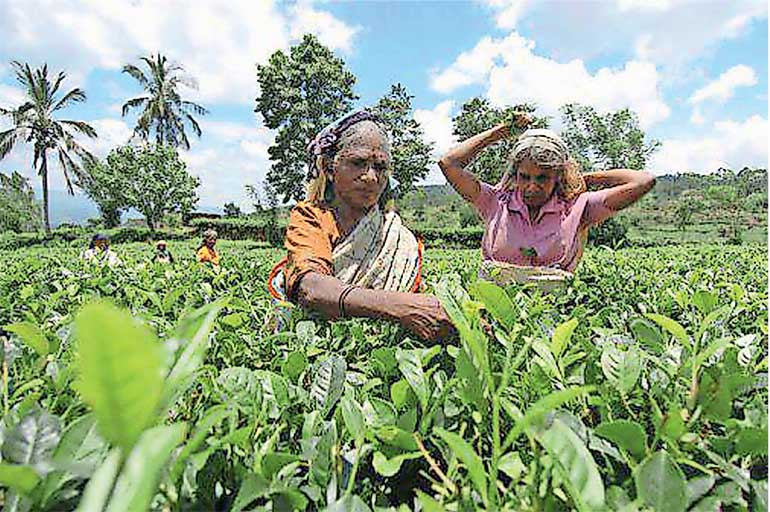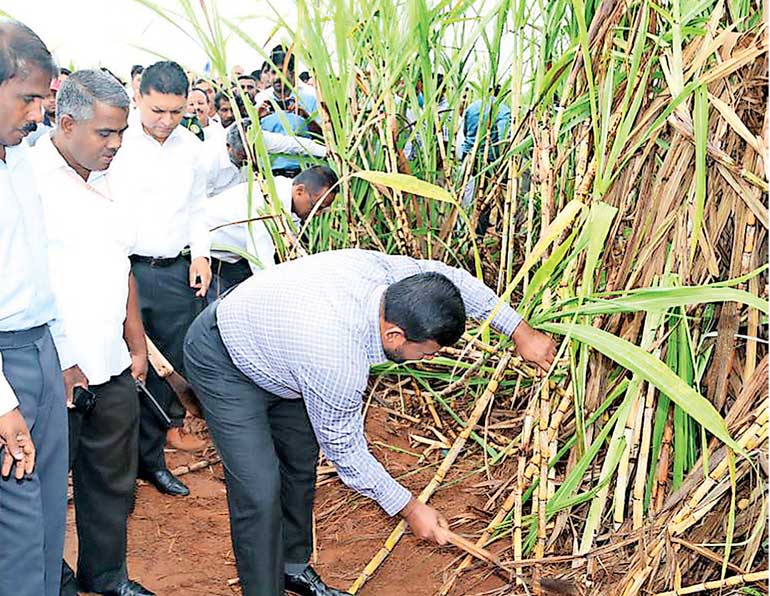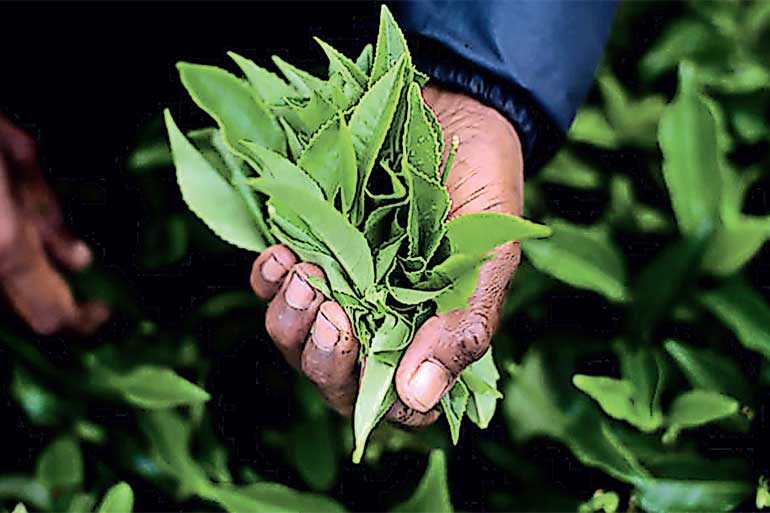Tuesday Feb 24, 2026
Tuesday Feb 24, 2026
Monday, 6 March 2017 00:01 - - {{hitsCtrl.values.hits}}

In recognition of the 150th year of Ceylon Tea, the Planters’ Association of Ceylon has released a comprehensive list of the most recently available corporate sector data on the tea industry with a view to providing a more comprehensive understanding of the present state of the country’s Regional Plantation Companies (RPCs) and their contribution to the wider economy.
According to the latest RPC data, Estate Crop production for tea stood at 79.1 million kilogrammes, while bought crop accounted for a further 23.9 million kilogrammes, with cultivated extend for VP tea accounting for 37,353 hectares, while seedling tea accounted for a further 31,894 hectares at the end of 2016.
Commenting on the association’s latest release of information, PA Chairman Sunil Poholiyadde stated: “As we reach another major milestone for Ceylon Tea, our association believes it is imperative that we work together with all stakeholders to develop a clearer understanding of the present status and future trajectory of the plantation industry.
“While our association has maintained impeccable records detailing every aspect of production, with 150 years of rich history behind us, we believe that this data should now be utilised to generate fresh insights into the performance of the RPCs, their immense contribution to the Sri Lankan economy to date and potential strategic frameworks that could serve to reinvigorate the industry and power its growth for another 150 years and more.”
He added that a further announcement on this subject could be expected from the PA in the coming months.


Despite continuing hardships arising from adverse weather conditions, the diminishing availability of labour and significant declines in commodity prices, RPCs continued their investments into the estate sector as evidenced by cumulative investments by RPCs reaching Rs. 70 billion between 1992 and 2016. During this same period, RPCs contributed substantially toward Government revenue through lease rentals which stood at Rs. 6.69 billion, income tax which accounted for a further Rs. 1.72 billion while dividends were also released to Sri Lankan shareholders over the period from privatisation amounting to a total value of Rs. 8.17 billion.
The RPC sector has also led the way in terms of replanting, accounting for 24,575 hectares out of a total 36,766 hectares of replanted tea in the RPC Estates of Sri Lanka. Including RPC rubber plantations, the sector’s new planting and re-planting has covered an extent of 37,971 hectares while the RPCs lost a further 4,420 hectares of land to acquisitions by the State and others. The percentage of replanting/new planting in both Tea and Rubber in the RPCs easily surpasses the percentage rate of replanting in both the Tea Smallholder and Rubber Smallholder sectors, both of which receive extensive subsidies, financial assistance and other benefits from the State.
Total labour in the RPC sector as at the end of 2016 comprised 67,021 male employees and 87,495 female employees. The RPC sector continues to provide comprehensive healthcare and other welfare services such as prenatal care to expectant mothers and total custodial child care up to five years for all the children of its employees while providing other facilities and amenities to their dependents as well. It is currently estimated that the total beneficiaries of RPC welfare programs are in excess of 1 million. Since privatisation, significant and marked improvements to the health status of RPC employees have been recorded where some indicators have performed better than national averages. The Poverty Head Count in the Estate sector as a whole has declined from a height of 38.4 PHC at the time of privatisation. The Nuwara Eliya District, where 62% of its population is from the RPC community, has a poverty head count of only 6.6, which is even better than the National Average of 6.7.
In addition to its leading role in terms of production, replanting and welfare, the RPC sector has also consistently promoted the adoption of the most stringent agricultural standards and practices, particularly through the adoption of international quality certifications.
At present, there are 688 international certifications for 297 RPC factories including HACCP, ISO 22000, Fair Trade, Forest Stewardship Certification(FSC) ISO 9000, CQC, Ethical Tea Partnership (ETP), UTZ, Rainforest Alliance (RA), Global GAP, SA, etc. thereby ensuring the maintenance of extremely strict production and processing standards that ensure the safety of consumers, workers and the wider environment.
UTZ is currently the largest international program for sustainable farming of coffee, cocoa and tea in the world and covers agricultural best practices, farm management and environmental protection. Similarly, certifications like the Rainforest Alliance are internationally renowned for their ability to help communities around the world to mitigate social and environmental risks arising out of estate sector activities. This is achieved through strict limitations on the application of agrochemicals and the implementation of integrated pest management practices that decrease dependency on chemical-based weedicides and pesticides where possible.
The certification also requires RPCs to ensure protection of drinking water sources and the provision of safe drinking water to communities and the rational use of water that ensures efficiency of use and the prevention of wastage.
The total revenue from RPCs added to the local economy without any value addition at the estate level is over Rs. 70 billion annually from tea, rubber and oil palm plantation crops at Estate Levels. While the RPCs are directly responsible for the sustenance of a plantation community of over one million people resident in their plantations, across High, Mid and Low Grown elevations, hundreds of villages, local bazaars, small enterprises and ancillary services are totally dependent on the local plantation economy for their survival.
Furthermore, the Ceylon Tea image and the branding of Food Factory Concept, Chemical Free Tea, Cleanest Tea in the world, Ethically Managed Plantations, Zero Child Employment, Ozone Friendly Tea, Sustainable Agriculture, Product Traceability to Source and Single Origin Estate Marks are predominantly leveraged on RPC estates, management systems and services and facilities provided for their employees which is greatly useful for the total Ceylon Tea image branding.
While the RPCs have taken over the estates when the State had to subsidise the Estate sector to the tune of Rs. 5 billion per year by 1992, RPCs have continued to manage without being a burden to the State. Any diminution of the RPC sector will have far-reaching consequences not only to the people employed in the plantation sector and to the tea industry but to the country as a whole.